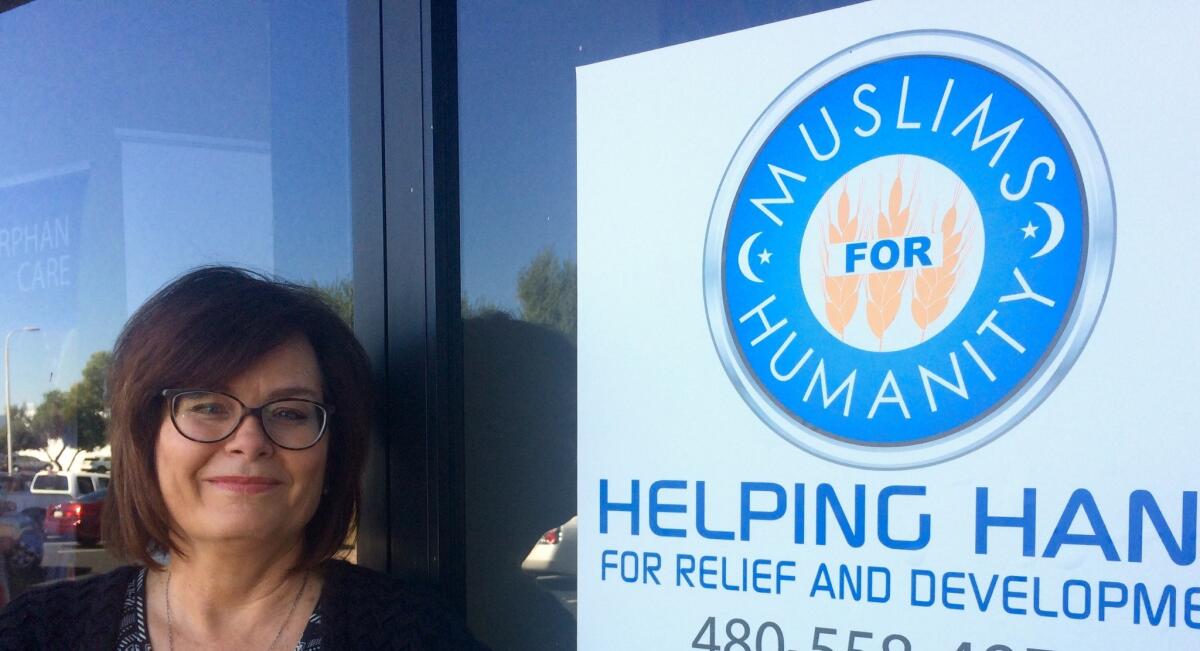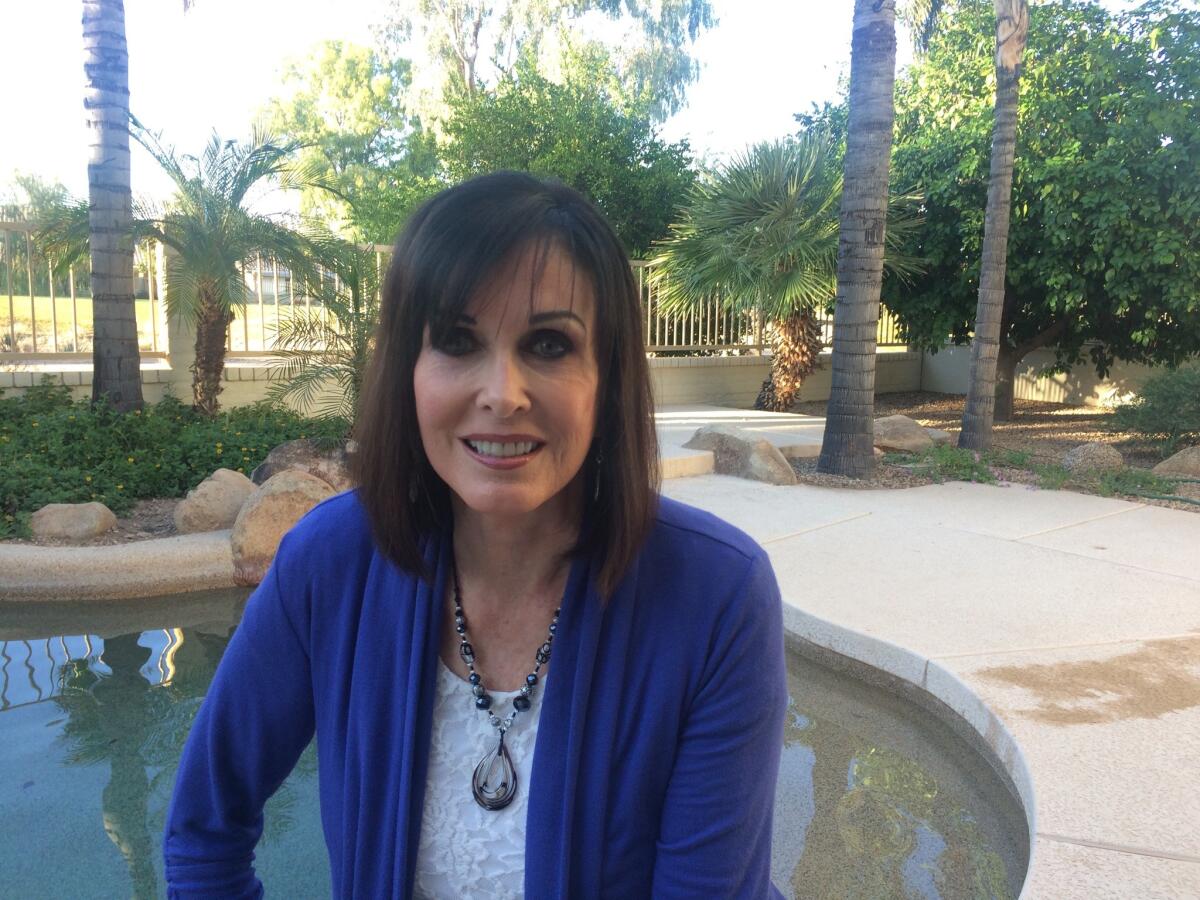It’s not just women and minorities. Donald Trump has a Mormon problem — and here’s how it could cost him
- Share via
Reporting from MESA, Ariz. — No religious group has been more reliably Republican than members of the Mormon faith, who routinely vote in landslide numbers for the party’s presidential nominee.
But Donald Trump — with his garish personality, libertine attitude and caustic rhetoric toward immigrants, women and others — has caused many church members to search their souls and rethink their longstanding political allegiance, reshaping the presidential map in dramatic and unexpected ways.
Nevada, a neck-and-neck battleground, has started moving Hillary Clinton’s direction. Arizona, a Republican-leaning state once seen as far beyond the Democratic nominee’s reach, is now a tossup. Even Utah, the church’s wellspring, where four years ago President Obama barely mustered 25% support, has grown competitive.
All are states with significant Mormon populations where, normally, the GOP nominee could count on church members’ overwhelming support.
But in Trump’s case, “the overlap starts and stops” with his Republican affiliation, said Quin Monson, a political science professor at Utah’s Brigham Young University. “Everything else about him doesn’t match up very well.”
Laura Clement, a Mormon and lifelong Republican, was blunter still. “The way he speaks is very hateful and divisive,” said the 41-year-old Mesa resident. “Imagine him being president of our country for four years. It would be an embarrassment.”
It’s not as though Clinton is likely to receive a flood of support from Latter-day Saints, though her campaign has created, with hope and much gauzy imagery, a “Mormons for Hillary” ad that aims at Republican defectors.
Clement, for one, can’t bring herself to support the Democrat — “I don’t care for her character and disagree with her policies” — so she plans to write in independent Evan McMullin, a Mormon and former congressional staffer waging a none-of-the-above campaign. “Anything,” she said, “to stop Hillary and Donald.”
The history of Latter-day Saints is one of persecution, which makes the faithful acutely sensitive to religious bigotry and hostility toward outsiders. Forced to settle in the harsh but safe haven of the Salt Lake Valley, at the foot of Utah’s jagged Wasatch Mountains, believers spread their faith throughout the West. (Las Vegas, now synonymous with sin, was founded by Mormon settlers.)
Today, nearly 60% of Utah residents are Mormon. In Idaho, just about a quarter. In the rest of the country, the percentages are small: just 6% of the population in Arizona, Nevada and Wyoming, the next-highest ranking states.
But their political clout belies those numbers.
Nevada’s two U.S. senators, Democrat Harry Reid and Republican Dean Heller, are Mormon, as is Arizona’s Jeff Flake, who has been one of Trump’s harshest Republican critics, alongside Mitt Romney, the 2012 GOP nominee and most politically prominent member of the faith.
If Trump wins, “I think I’ll be in Gitmo,” Flake joked, referring to the military prison.
Flake used to be the congressman here in the sprawling suburbs east of Phoenix, the hub of the state’s Mormon community and a reflection of Salt Lake City, with its clean, broad streets arrayed in a meticulous grid. His successor, Republican Matt Salmon, is Mormon, as is the GOP state senator expected to replace the retiring Salmon.
One reason for Mormons’ outsized political influence in Arizona and the West is that church members can be relied upon to vote, turning out in consistently high numbers. Civic duty is an important part of their faith, which makes the choice this presidential election all the more wrenching; for many Latter-day Saints, staying home is simply not an option.
“They are completely disgusted with Trump’s candidacy and do not want to support him,” said Susan Udall, 54, who has not decided how she will vote — other than opposing Trump. “Even those who are going to support him, many, many — I would say the majority I have spoken with — are not happy they’re faced with this choice.”

On a recent morning, Udall was at a Muslim charity not far from her Mesa home, overseeing an assembly line of volunteers packing boxes with rice, beans, cooking oil and children’s clothing for shipment to Syrian refugees in Lebanon.
Like many of her faith, the self-described Reagan Republican was offended in December when Trump called for a blanket ban on Muslim immigrants, as a way, he said, to fight terrorism. The church, which teaches compassion for immigrants and sends missionaries proselytizing throughout the world, issued a statement extolling religious freedom and swiping, indirectly, at Trump.
Earlier this month, the church-owned Deseret News went further, breaking with 80 years of precedent and issuing a scathing editorial urging the GOP standard-bearer “to step down from his pursuit of the American presidency.” Udall posted the editorial on her Facebook page.
“I find him extremely divisive and deprecative of people he considers weak,” said Udall, a mother of three boys who has the take-charge manner of someone used to mustering volunteer forces. “Women, minorities, POWs, immigrants, refugees.”
Others have their own catalog of grievances: Trump’s boorish reality-show behavior, his appearance on the cover of Playboy magazine and, most recently, his boastful talk of using his celebrity to force himself on women.
“I just can’t vote for somebody that is that lewd, that rude and divisive,” said Udall’s 27-year-old son, Nathan, a third-year law student and registered Republican who is strongly leaning toward Libertarian Gary Johnson. He was shocked when Trump said in Wednesday night’s debate he may not abide by the results of the election.
“I think that could be incredibly dangerous,” Udall said, “especially from someone who is as erratic and unpredictable as he is.”

For some Latter-day Saints, however, like Nancy Wudel, there is a singular reason to ignore behavior they would otherwise never condone: the certainty the next president will appoint at least one lifetime member of the U.S. Supreme Court, and perhaps several more.
“I don’t want a future where I live with a majority that is a liberal and socialist majority, that wants global government, that is anti-religious freedom, that is pro-choice and not pro-life,” said Wudel, 69, who staked a Trump sign in front of her Mesa home, the only visible reminder of the election amid the immaculate desert landscaping of her gated community.
Wudel acknowledged there is no guarantee Trump will follow through on his pledge to appoint conservative justices, but it’s a risk the actress and film producer is willing to take. “With Hillary,” she said, “you know what you’re going to get.”
Yasser Sanchez has heard others make that case. It is, he said, “the only plausible argument I can think of that any good human being with a soul can vote for Trump.”
But that’s not enough for the 38-year-old immigration attorney, who feels compelled to turn down his TV anytime there is mention of the presidential campaign, to keep his four children from hearing the sordid details of Trump’s sexual conduct.
Sanchez has a wall in his Mesa law office decorated with photographs of sports stars and Republican luminaries, including Flake, President George W. Bush and Romney. The latter stands in profile alongside Sanchez; inside the frame are the words “Juntos con Romney” — Together with Romney.
But Sanchez won’t have anything to do with Trump, “a con artist and buffoon,” in his estimation. He plans to support McMullin for president.
Like many fellow Mormons and Republican faithful, Sanchez described the campaign as a sad and wrenching ordeal, which — he hopes — will end in a crushing Trump defeat.
Then, he said, “We will take back the party from this nonsense.”
ALSO
One big reason the WikiLeaks emails aren’t as damaging for Hillary Clinton: Donald Trump
Outbid, outhustled, outmuscled: Trump has never been able to conquer Southern California
Hillary Clinton keeps fishing for big money while lagging behind with smaller donors
More to Read
Get the L.A. Times Politics newsletter
Deeply reported insights into legislation, politics and policy from Sacramento, Washington and beyond. In your inbox twice per week.
You may occasionally receive promotional content from the Los Angeles Times.











